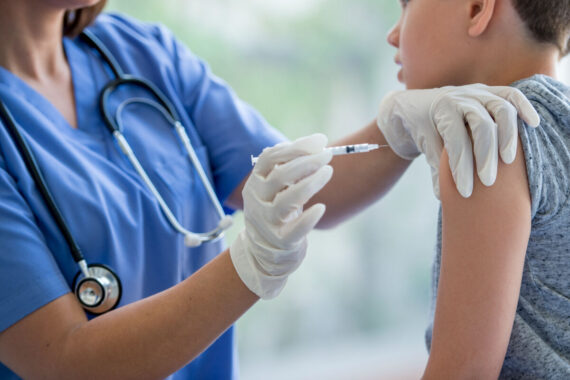Rise in parents seeing worrying vaccine information online

The number of parents who report having come across information that made them concerned about vaccination has grown dramatically in a year, a survey from the UK Health Security Agency (UKHSA) has found.
As part of the annual analysis of attitudes towards vaccination, 20% of parents surveyed in 2023 said they had come across information that included something that made them concerned, compared with 6% the year before, UKHSA officials reported.
Online sources and social media were the main sources of worrying information, respondents said
But most parents had seen or heard information in favour of vaccines and continued to have trust in the NHS childhood immunisation programme, the survey found.
Overall, with regards to childhood vaccines, 89% agreed that vaccines work, 84% that they are safe and 82% that they were trusted.
Healthcare professionals continue to be the most trusted source of information on vaccines as well as NHS resources, the research showed.
The overwhelming majority of parents (86%) said that healthcare professionals were their most trusted sources of information, ranking higher than online sources, friends and family and TV and radio, UKHSA said.
While 83% of parents felt their baby would have all vaccines offered before they spoke to a health professional, following a discussion with them, 14% changed their mind in favour of vaccination.
Last autumn, the UKHSA said it was ‘seriously concerned’ about an ongoing downward trend in the uptake of childhood vaccines with none of them meeting the World Health Organisation (WHO) 95% uptake target in England.
Annual figures from 2022/23 show falling uptake of between 0.1 and 1.2 percentage points across 12 of 14 measures.
There was variation across UK regions but in England MMR levels for the first and second doses by five years in England fell to the lowest rates since 2010/11, the most recent annual figures for 2022/23 showed.
This winter there has been repeated warnings about rising cases of measles and whooping cough.
A national incident was declared in January after a rapidly spreading measles outbreak largely centred on the West Midlands.
The latest figures show there have now been 789 confirmed cases of measles in England since October. Cases in the West Midlands have now started to decline but small clusters have emerged in other regions including London and the North West.
A national marketing campaign to reverse the decline in vaccine uptake has been launched, alongside an operational catch up campaign for those who have missed doses.
Dr Mary Ramsay, head of immunisation at UKHSA, said: ‘The recent survey shows that most parents have confidence and trust in the NHS childhood vaccination programme and it’s reassuring to see that 86% of parents say that NHS resources and healthcare professionals are their most trusted sources for information.
‘It’s completely natural for parents to have questions on vaccines and our survey shows just how important healthcare professionals are in ensuring parents get to know the facts around vaccination and the devastating diseases they protect against.
‘I urge any parents who have concerns or questions about vaccines to speak to their GP, midwife, health visitor or other trusted healthcare worker or visit nhs.uk for the latest advice and answers to common questions.’
Speaking on measles outbreaks, Dr Vanessa Saliba, UKHSA consultant epidemiologist, said while the measles outbreak in the West Midlands is now on a downward trend there have been small clusters emerging in other regions and so we cannot be complacent.
‘It only takes one case to get into a community with low vaccination rates for measles to spread rapidly, especially in schools and nurseries.
‘We know that hundreds of thousands of children around the country, particularly in some inner-city areas are still not fully vaccinated and are at risk of serious illness or life-long complications but measles is completely preventable with vaccination.’
Uptake of childhood vaccinations in England remains too low, public health experts responding to the latest quarterly data said last week. And unless uptake improves, there is likely to be re-emergence of more vaccine-preventable diseases, they warned.
Visit Pulse Reference for details on 140 symptoms, including easily searchable symptoms and categories, offering you a free platform to check symptoms and receive potential diagnoses during consultations.









